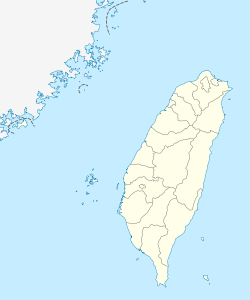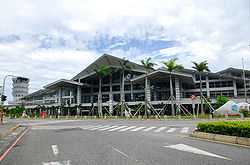Hualien Airport
| Hualien Airport 花蓮航空站 花蓮機場 Huālián Hángkōngzhàn Huālián Jīchǎng | |||
|---|---|---|---|
.jpg) | |||
IATA: HUN – ICAO: RCYU
 HUN | |||
| Summary | |||
| Airport type | Public | ||
| Operator | Civil Aeronautics Administration | ||
| Location | Hualien,Taiwan | ||
| Elevation AMSL | 52 ft / 16 m | ||
| Coordinates | 24°01′23″N 121°37′04″E / 24.02306°N 121.61778°ECoordinates: 24°01′23″N 121°37′04″E / 24.02306°N 121.61778°E | ||
| Runways | |||
| Direction | Length | Surface | |
| ft | m | ||
| 03/21 | 9,022 | 2,750 | Concrete |
Hualien Airport (Chinese: 花蓮機場) (IATA: HUN, ICAO: RCYU) is a commercial airport located in an 11.5-hectare (28-acre) civilian area of a military airbase in Xincheng Township, Hualien City, Hualien County, Taiwan. It primary serves domestic flights although it can handle international charter flights as well. The proximity of Hualien Airport to a military base has caused some tension between travelers, airline officials, and the Republic of China Air Force, especially when civilian flights are cancelled due to war games exercises.
History
The airport was opened on May 16, 1962, for military and domestic civilian use. Before this, Hualien was a military gravel airfield.
On April 27, 2001, Hualien Airport became certified to serve international flights, specifically charter flights to and from Japan (to nearby Yonaguni in particular). The first Japanese charter arrived at Hualien on October 1, 2001. Charter flights to South Korea began on August 8, 2004, and charters to Macau began on October 19, 2004. There has also been discussion of using Hualien for charter flights to mainland China under the Three Links scheme.
Accidents and Incidents
- On October 26, 1989, China Airlines Flight 204 crashed into a mountain shortly after takeoff from Hualien Airport. All 54 passengers and crew on board died.
- On August 24, 1999, a Uni Air MD-90 flight from Taipei carrying 96 passengers and crew exploded just after it landed at Hualien. The blast injured 28 people and killed one, although a pregnant woman miscarried days later. An investigation revealed that former Taiwanese decathlete Ku Chin-shui (古金水), who was not aboard the flight, had given bottles of flammable liquid to his nephew to transport. Ku was convicted in 2002 and sentenced to seven and a half years in prison, but a later trial upon his appeal found him not guilty on December 27, 2004.[1]
Expansion

Because Hualien City is a popular gateway into Taroko National Park, the airport became too small and outdated for the growing number of tourists. It underwent a significant expansion between 2002 and 2005 in anticipation of increased traffic from international charters and in an effort to spur local economic development. Plans called for new passenger and cargo terminals, new air bridges, and a new apron. The new passenger terminal was opened on March 19, 2004, at a cost of NT$2.3 billion (US$69 million). It incorporates design cues from both classical Chinese and Aboriginal Taiwanese architecture, though the building overall has a modern look with copious use of granite, marble, steel, and glass. Hualien's terminal is one of only three airport terminals in Taiwan whose layout allows aviation enthusiasts clear views of takeoffs and landings (the other two being Taiwan Taoyuan International Airport, Taipei, and Kaohsiung International Airport, Kaohsiung). However, even though the new terminal was designed to serve international clientele, the airport so far has neither the level of passenger usage nor the appropriate aircraft maintenance ground services to merit "international" status.
Airlines and destinations
| Airlines | Destinations |
|---|---|
| Mandarin Airlines | Kaohsiung |
| Shandong Airlines | Jinan |
| TransAsia Airways | Hangzhou, Taichung, Taipei-Songshan, Tianjin, Wuhan |
Transportation
The airport is accessible within walking distance South East of Beipu Station of the Taiwan Railway Administration.
References
External links
| Wikimedia Commons has media related to Hualien Airport. |
- Hualien Airport official website
- Airport information for RCYU at World Aero Data. Data current as of October 2006.
- Hualien Air Base, Federation of American Scientists
| |||||||||||||||||